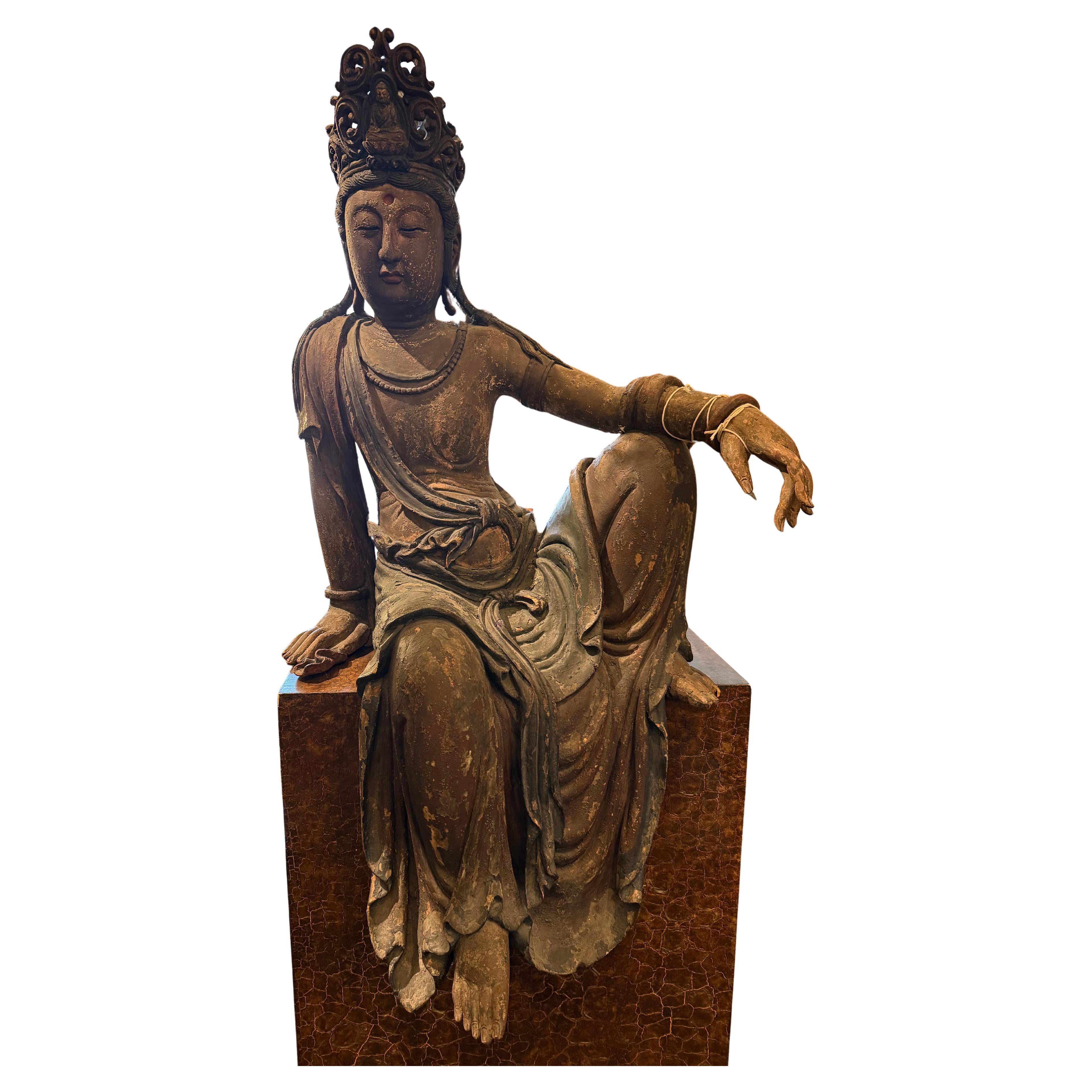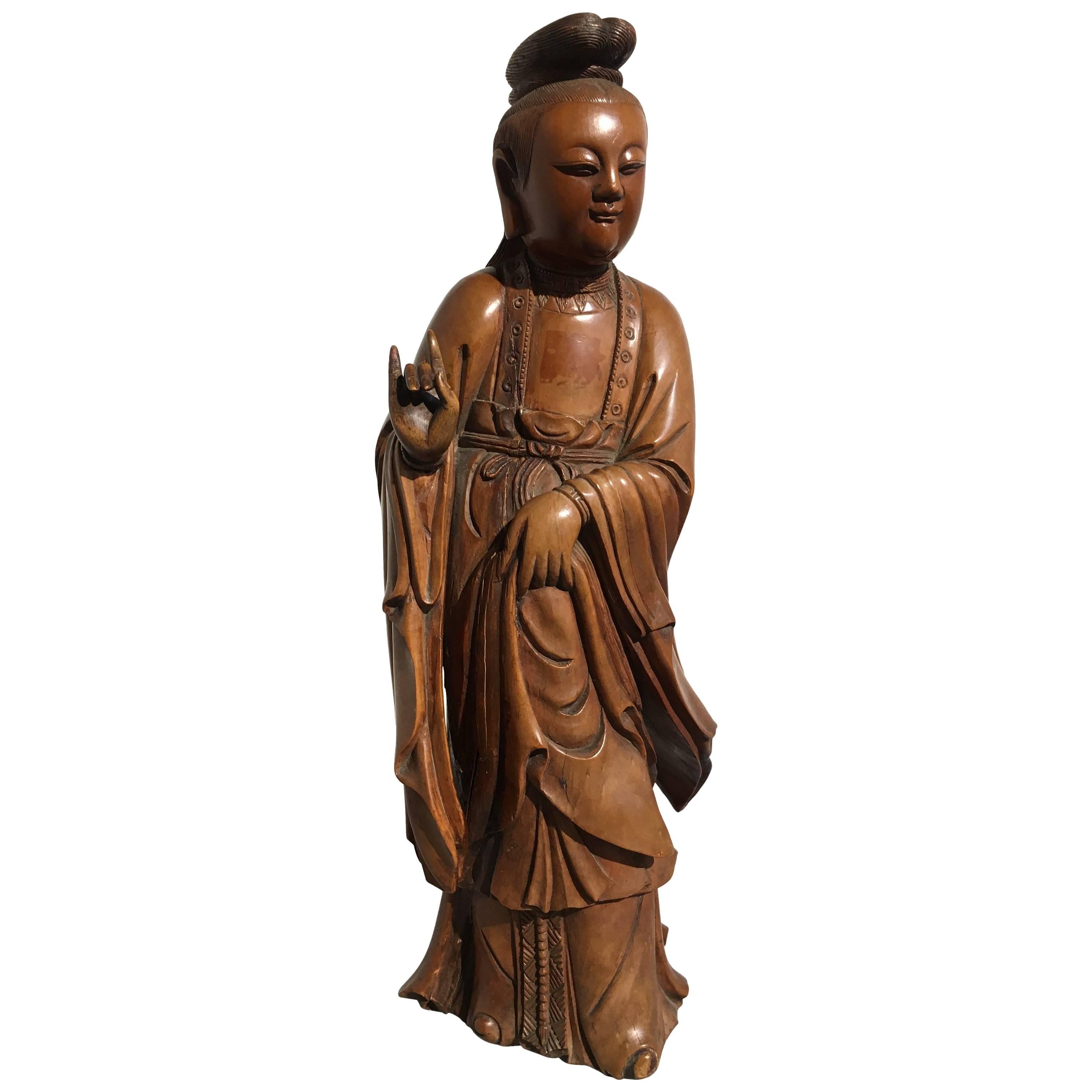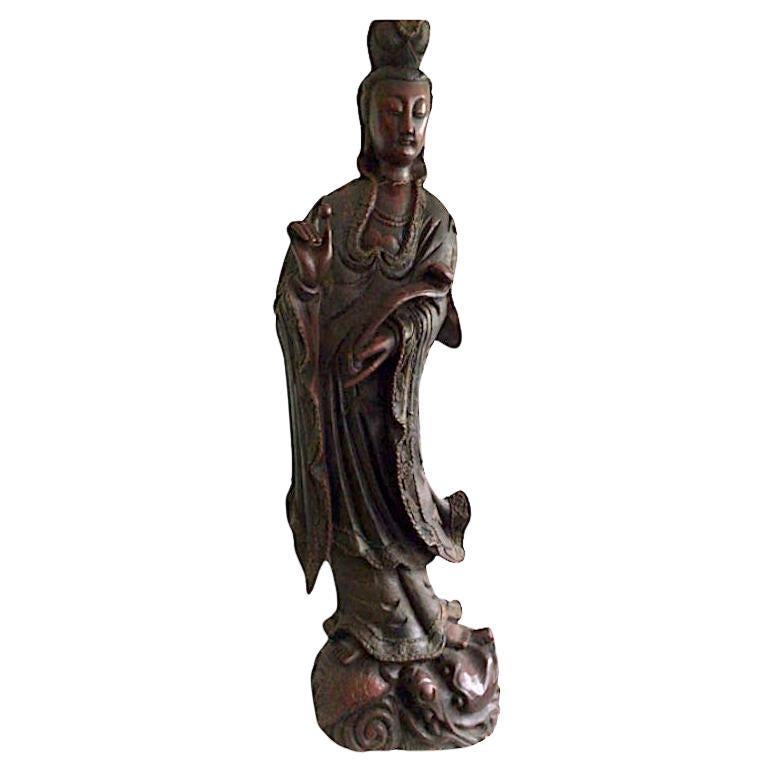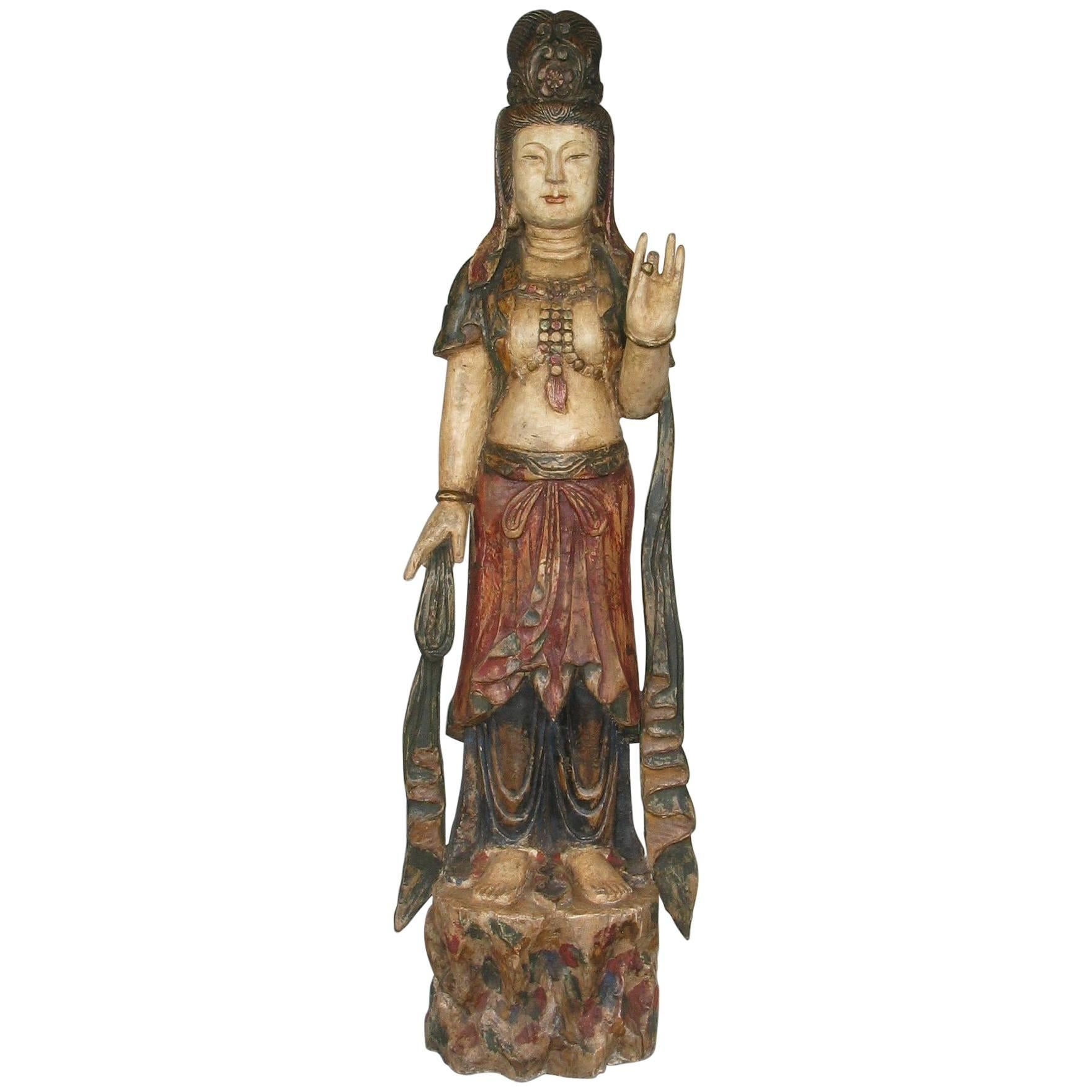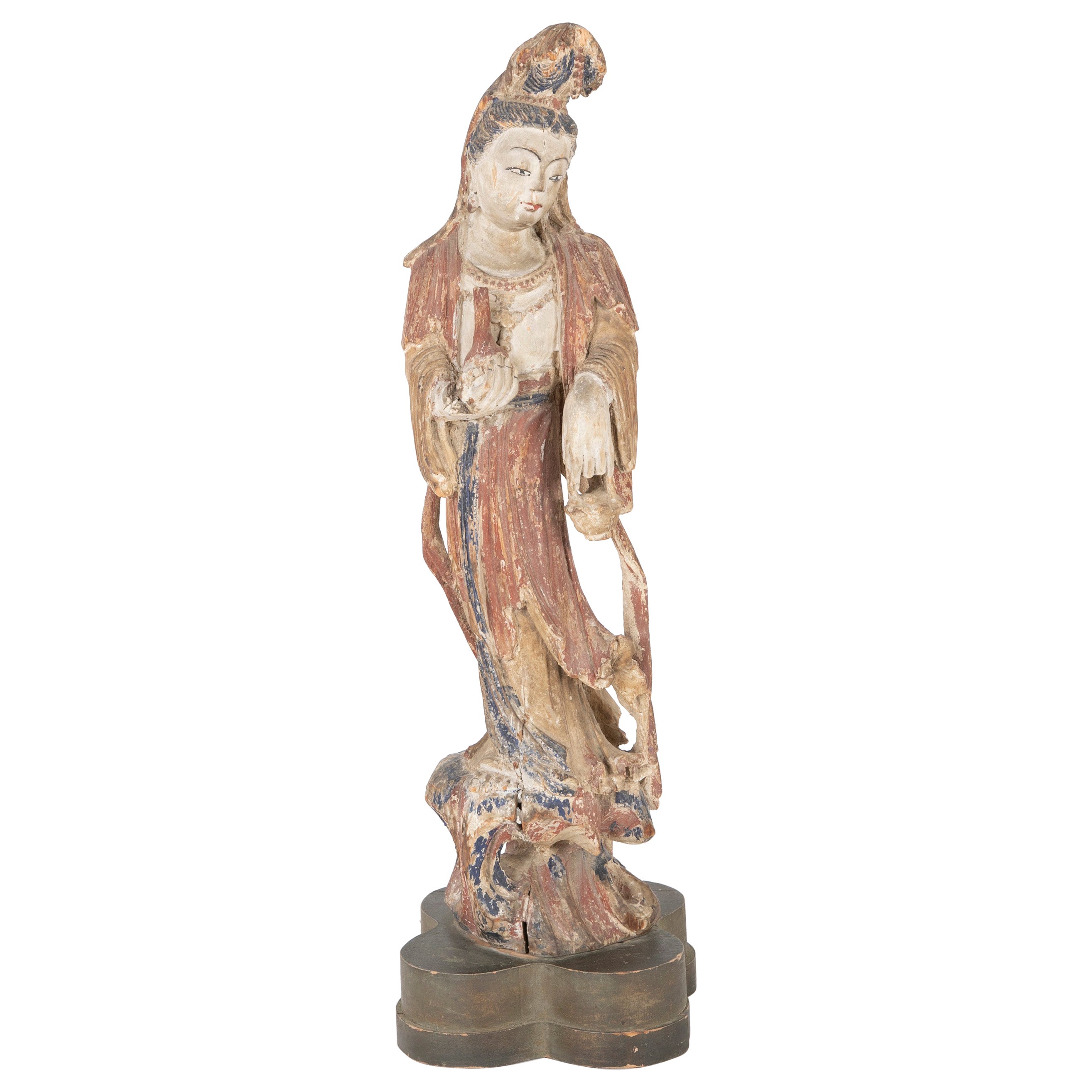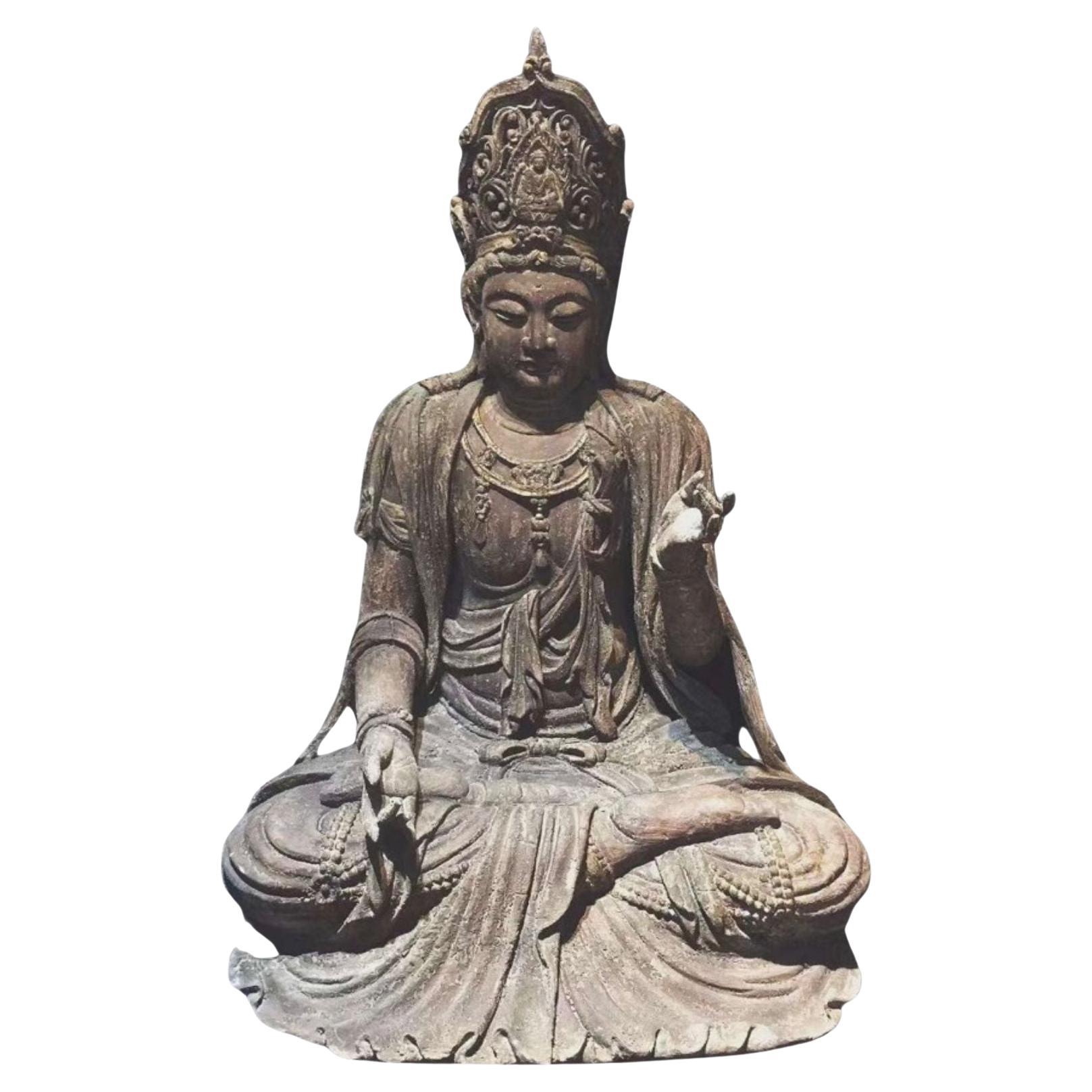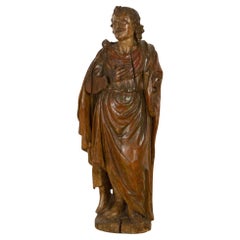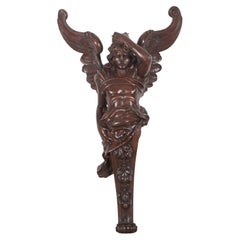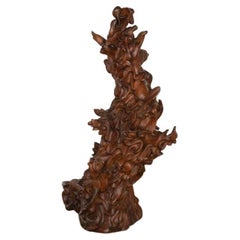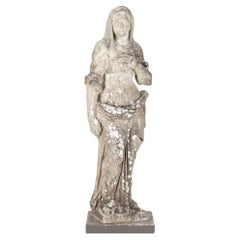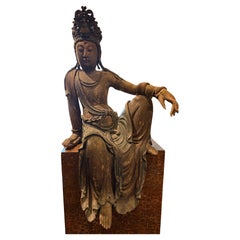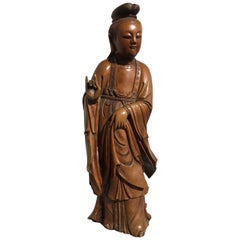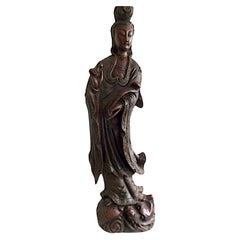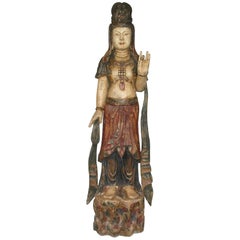Items Similar to Early 17th Century Carved Wood Figure of Guanyin
Want more images or videos?
Request additional images or videos from the seller
1 of 7
Early 17th Century Carved Wood Figure of Guanyin
$7,809.41
£5,700
€6,660.01
CA$10,872.18
A$11,892.52
CHF 6,217.71
MX$143,248.76
NOK 77,712.72
SEK 73,311.04
DKK 49,716.23
About the Item
17th Century carved figure of Guanyin in Rajalalitasana position.
Seated on rock with the right arm rested on the right knee. The figures are wearing loose robes that open at the chest to reveal an elaborate necklace. The face with a benevolent expression beneath the hair piled up into a high chignon behind a foliage tiara.
十六/十七世纪 木胎彩绘轮王坐观世音菩萨像
- Dimensions:Height: 13 in (33 cm)Width: 7.88 in (20 cm)Depth: 5.52 in (14 cm)
- Materials and Techniques:
- Place of Origin:
- Period:
- Date of Manufacture:Unknown
- Condition:Wear consistent with age and use.
- Seller Location:Gloucestershire, GB
- Reference Number:Seller: DA07388481stDibs: LU961445609062
About the Seller
4.9
Vetted Professional Seller
Every seller passes strict standards for authenticity and reliability
1stDibs seller since 2013
195 sales on 1stDibs
Typical response time: 13 hours
- ShippingRetrieving quote...Shipping from: Tetbury, United Kingdom
- Return Policy
Authenticity Guarantee
In the unlikely event there’s an issue with an item’s authenticity, contact us within 1 year for a full refund. DetailsMoney-Back Guarantee
If your item is not as described, is damaged in transit, or does not arrive, contact us within 7 days for a full refund. Details24-Hour Cancellation
You have a 24-hour grace period in which to reconsider your purchase, with no questions asked.Vetted Professional Sellers
Our world-class sellers must adhere to strict standards for service and quality, maintaining the integrity of our listings.Price-Match Guarantee
If you find that a seller listed the same item for a lower price elsewhere, we’ll match it.Trusted Global Delivery
Our best-in-class carrier network provides specialized shipping options worldwide, including custom delivery.More From This Seller
View All17th Century Carved Figure of a Saint
Located in Gloucestershire, GB
Mid 17th century Northern European carved figure of a saint.
This striking statue depicts a saint who is dressed in robes, whilst holding his hand over his heart. This figure is freestanding and is stood within a leaning position which makes him stand out.
It has been beautifully carved from oak and has remnants of its original paintwork.
Likely to have stood within a church for many years and would have been removed due to renovation reasons.
This historical figure...
Category
Antique 17th Century German Gothic Figurative Sculptures
Materials
Oak, Paint
Late 19th Century Carved Wood Angel Gabriel
Located in Gloucestershire, GB
Late 19th Century English carved pine wood figure of the Archangel Gabriel dating to 1890.
Fine detailing to the face, hair, body, wings, linen folds and fruit and leaves to the low...
Category
Antique Late 19th Century English Victorian Wall-mounted Sculptures
Materials
Pine
20th Century Javanese Sculpture
Located in Gloucestershire, GB
Fantastic 20th Century Javanese biomorphic sculpture.
This beautiful, hand-carved sculpture depicts waves and floating figures with wonderful movement throughout.
It is composed of...
Category
20th Century Indonesian Sculptures and Carvings
Materials
Wood
Large Early 19th Century Carved Marble Garden Figure of a Vestal
Located in Gloucestershire, GB
A glorious early 19th Century English carved marble garden figure of a Vestal of Neo-Classical style. In the manner of John Bacon. Most probably originally made for a niche, this fig...
Category
Antique Early 19th Century Country Statues
Materials
Marble
17th Century French Stone Bust
Located in Gloucestershire, GB
An extremely rare 17th Century French life size headless bust of a robed male mounted on a steel base.
This bust has had a small amount of restoration, ...
Category
Antique 17th Century French Folk Art Busts
Materials
Stone
Large 19th Century Anglo-Indian Carved Wood Elephant
Located in Gloucestershire, GB
19th Century monumental carved wooden elephant.
Intricately carved (down to the hairs on his legs) out of one enormous piece of wood. This elephant is a rare and one-of-a-kind find....
Category
Antique 19th Century Indian Anglo-Indian Sculptures and Carvings
Materials
Wood
You May Also Like
An Important Chinese Carved Wood Figure of Guanyin, Ming Dynasty, 17th Century
Located in ARMADALE, VIC
An Important Chinese Carved Wood Figure of Guanyin, Ming Dynasty, 17th Century
Description:
A dignified portrayal of the bodhisattva, respl...
Category
Antique 17th Century Chinese Ming Sculptures and Carvings
Materials
Wood
Chinese Carved Boxwood Figure of Guanyin, Mid-Qing Dynasty
Located in Austin, TX
A sublime Chinese carved boxwood figure of the Bodhisattva of Compassion, Avalokiteshvara, called Guanyin in Chinese, mid-Qing dynasty.
The an...
Category
Antique Late 18th Century Chinese Qing Sculptures and Carvings
Materials
Boxwood
1920s Carved Wood Guanyin Statue
Located in Tarrytown, NY
1920s Carved Wood Guanyin Statue
Beautifully fine carving details
Damage shown in pictures
Crack in neck
Category
Vintage 1920s Sculptures and Carvings
Materials
Wood
Chinese Carved Wood Standing Figure of Guanyin in the Ming Dynasty Style
Located in Ottawa, Ontario
A Chinese carved wood standing figure of Guanyin in the Ming dynasty style, with polychrome application, the hair tied back into an elaborate high chignon, with her left hand raised,...
Category
Early 20th Century Chinese Chinoiserie Sculptures and Carvings
Materials
Wood
Chinese Carved and Painted Wood Sculpture of Guanyin
Located in Stamford, CT
Beautiful carving of Guanyin, shown standing on a rocky outcrop, mounted on a lobed wooden base. It was once used as a lamp, and can be rewired. Nice faded painted surface.
Guany...
Category
Early 20th Century Chinese Ming Sculptures and Carvings
Materials
Wood
A Large Chinese Carved Wood Figure of Guanyin, Late Qing Dynasty
Located in ARMADALE, VIC
Description:
A singular example of Guanyin. Deviating from the Bodhisattva’s conventional pose of ‘royal ease’, the figure is instead seated in the meditative padmasana, or ‘lotus position’, rendering this Guanyin something of a rarity. An Apana more typically associated with depictions of Buddhas, Guanyin assuming this pose immediately signifies this figure as one of particular spiritual reverence. Both feet are revealed crossed upon one another from beneath fabric which spills before her, her left palm turned upward with her hand resting upon her left knee and her right raised in a relaxed gesture. Adorned with a diadem housing a depiction of Amitabha Buddha, her own spiritual guide, she exudes an air of tranquil regality, further characterised by her numerous strings of beads and elaborately fastened dhoti, attire traditionally reserved for Indian princes. Though the figure’s dress is Indian her face is undoubtedly exemplifying artistic Chinese beauty standards. Her face is soft and rounded, full in both the lips and cheeks, with eyes that restfully peer down, as though she is watching over the worries of mankind with compassion.
Notes on the item:
Guanyin is the Chinese interpretation of Avalokiteshvara, the Indian Bodhisattva of compassion. The term “Bodhisattva” is derived from the Sanskrit “Bodhi”, meaning ‘awakening’ or ‘enlightenment’, combined with “Sattva”, meaning ‘spirit’ or ‘being’, referring to one on the path to achieving enlightenment. Bodhisattvas in Mayahana Buddhism are recognised as figures who have effectively achieved enlightenment yet relinquish their accension to nirvana in order to remain amongst mankind in the ultimate act of compassion to aid as spiritual guides. As such, the Bodhisattva inhabit a liminal space between samsara and nirvana; enlightened beings that maintain a relationship with humanity that buddhas cannot, as attaining Buddhahood necessitates the abandonment of all worldly attachments, including mankind. Guanyin’s very name, ‘One who hears the cries of the world’ highlights this role as a compassionate figure who acknowledges the suffering and strife of man. Along with Mahāsthāmaprāpta, a fellow bodhisattva, Guanyin serves as an attendant to Buddha Amitabha, with these three deities recognised as the Three Sages of Western Pure Land Buddhism, a sect of Mayahana Buddhism popular in East Asia.
Avalokiteshvara is commonly posited to have been adopted from Indian Buddhism into China as Guanyin around 200-400 CE, however it was the Tang dynasty (618-907) which saw the popularisation of the deity. By the Ming (1358–1644) and Qing (1644–1911) dynasties, Guanyin held the position as the most popular female deity in China. The unique state of religion in China held no monolithic canon regarding Buddhism and saw the assimilation of several belief systems, primarily Daoism, Buddhism and Confucianism. Consequently, Guanyin became a deity to be revered beyond Buddhism alone, appointed as both an official imperial deity and Daoist deity in the 12th century. Guanyin may also be seen to fulfil the role of idealised femininity as prescribed by Confucianism, with the scarcity of female Chinese deities perhaps accounting for the gradual gender shift Guanyin underwent.
The Indian Avalokiteshvara is unequivocally recognised as male, whilst the supposed gender of Guanyin remains contentious. Although there is a clear shift from the masculine Avalokiteshvara towards a more feminine representation, it is unclear if Guanyin is understood to be entirely feminine, to inhabit qualities of both genders or to be elevated beyond gender entirely, embodying neither. Depictions of Guanyin are highly androgynous, which some believe lends credence towards Guanyin symbolising the unity of dualistic forces as recognised in Daoism, displaying the anthropomorphism of yin and yang.
Comparative Analysis:
Market comparisons of similar Qing Dynasty polychrome figures of Guanyin include lot 767 (no.2) From Christies ‘Important Chinese Ceramics and Works of Art,’ New York, 25 March 2022, with the price realised USD 52,920 (Estimate USD 20,000 – USD 30,000). Christies also auctioned a comparable polychrome Guanyin...
Category
Antique Late 19th Century Chinese Qing Sculptures and Carvings
Materials
Hardwood
